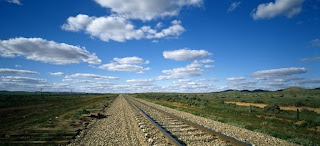Sleepers
At the end of our garden is a field. At the bottom of that
field is a railway line. The Cambrian Coast mainline runs less than 500m from
our home, separating us from the beach, and the sea beyond. Having a trainline
so close has never bothered us. There are at most ten, two- carriage trains running
a day. Indeed it was such a novelty when we first moved in that one of us would
yell ‘train’ excitedly whenever one passed. I admit that I have started to do
that again, now that our grandson visits regularly.
That was until Network Rail thought it was a good idea to do
some routine maintenance on the line, including the replacing of worn sleepers.
And, so as not to disturb the train scheduling, that work would be done between
1 am and 5 am, on three consecutive nights. The very same nights when the
summer finally deigned to arrive this far north, and it was impossible to sleep
with the windows closed. It turned out it was going to be impossible to sleep
whether the windows were open or closed.
Now we are very tired. I am tired because, as you might have
picked up, I have just launched my second novel out into the world. It has been
a demanding time, full of excitement, but not a little stress. We have also
been dealing with some family health issues, caring for a very active grandson,
and trying to get the house renovations done. So sleep is especially precious
at the moment.
I have grown up believing that sleepers were so called
because they were laid down in rows like sleeping men. Well a quick
consultation with Mr Google, and I found out that the name ‘sleeper’ could come
from the Norwegian ‘sleep’, the name given for a piece of timber used for
dragging things over. Apparently the name sleeper has been used for laid flat
pieces of timber in old buildings, for centuries. Oh and on further, middle of
the night, researching, I found other uses for the word ‘sleeper’. Of course,
it describes a person sleeping (I wish) but also can refer to a spy, something
undercover, that is more important that anyone realises until he/she or it
comes to light. Other meanings: a railway carriage to sleep in (again, ironic),
pajamas with feet (too hot), a piece of furniture that opens into a bed (maybe
the sofa is calling?), a type of tropical fish that rests in shallow waters
(not dead at the bottom of the tank), an unexpected hit e.g. movie or
book (dream on), an incubus (bit scary to think about in the dark hours) or a
dormouse (cute).
After all that research you would think I would be ready to
sleep. But with the Clangers (remember them?) as we aptly named the railway
maintenance crew, still lending their unique soundtrack (see what I did
there?), I just let my mind go to other words that have many meanings. The
English language is awash with them. Of course they were suddenly all sleep
related.
If I could just get comfortable in my (flower, truck, river) bed.
Put my head down on my (down) pillow and pull up the nice cool sheet (of glass,
tin, paper, rain). Maybe even snuggle under a blanket (of snow, mist or fog).
Then perhaps with what is left of the rest of the night, I can rest
my weary head, and get some much needed rest.
Joy Margetts has loved writing for as long as she can remember. A retired nurse, mother of two, and a new grandparent, she also has a lifelong interest in history. She makes her home on the beautiful North Wales coast.
Her debut novel 'The Healing', a work of historic fiction, was published by Instant Apostle on 19 March 2021. Joy has also self published a short novella, 'The Beloved' as both a companion to 'The Healing', and as an easy to read standalone story, which is available on Amazon Kindle.
Her second full - length novel, 'The Pilgrim', was published by Instant Apostle on 22nd July 2022
More information on Joy and her writing, and her personal blog, can be found here www.joymargetts.com



What a fabulous post, Joy. Thank you. I love the English language, the play on words and the nuances. Great for a writer.
ReplyDeleteThank you 😁
DeleteI feel your frustration, but at least you put the time to good use. I especially love the 'Clangers' reference. I wonder if they had a Soup Dragon?
ReplyDeleteIf they did I didn't hear it! 🤣
DeleteDifferent sort of dragon in Wales...! I do love the richness of the English language; it's one of the things I talk to the children about in school to encourage them to expand their vocabulary in creative writing.
DeleteLovely post! I have always had a sympathy for peope who live close to railway stations or have trains passing behind their homes. May God grant you the much needed rest and get the rail team to complete their work in quick time. Blessings.
ReplyDeleteThank you as always for your encouragement Sophia!
DeleteThank you for you labour of love.
ReplyDeleteI siesta in the day !!!!
I find myself dropping off if i sit down in the afternoon... is that the same as a siesta?🤣
DeleteWhat an impressive, fruitful night of word-searching! The English language is astonishing, which reminds me again of how challenging it must be to learn as a foreign language.
ReplyDelete